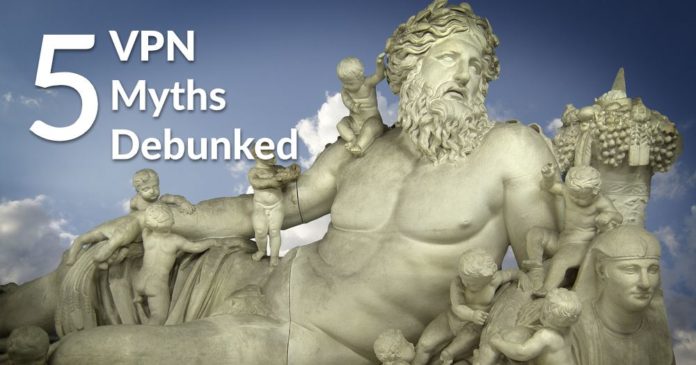
These days, you can hardly browse the web without reading about new threats to our privacy and security. To be fair, some of those articles are well written and have a point, but some are scaremongering and, well, false.
One of the subjects that keep popping up on forums and various blogs is VPN — how it’s used, whether it can protect you and how, and is it worth it.
There are many myths surrounding VPNs and so we’ve decided to debunk some of the most popular ones. And that’s what we’ll try to do — to help you distinguish true from false — so you get to better understand VPNs. And why they’re so important… But I’m getting ahead of myself — here are 5 of the most commonly quoted VPN misconceptions…
1. Free VPNs work just as well
I guess you can sometimes use a free VPN to watch a Netflix show but you can’t rely on such service at all times. There could be moments when a free VPN will deliver a sufficient bandwidth to watch the entire movie on some streaming service or to download a file via BitTorrent, but this tends to be an exception rather than the rule.
As they say it, if a product is free – you are the product. In other words, your data will be stored and potentially offered to advertisers. This kills the point of a VPN — to give you privacy and anonymity. And those two are unfortunately emerging as luxuries these days — let us remind you on the infamous Facebook-Cambridge Analytica scandal.
Simply put, operating a good VPN costs real money, and if such service is offered for free — chances are the company offering it will find other ways to make some cash. And that “other ways” tends to include users’ data.
2. A VPN will slow down my internet
To be fair, this could happen if you’re connecting to a busy server. But, best VPN providers not only have a few thousand servers to choose from but also let you know in advance how each of the servers is performing at any given moment. That’s one of the things that makes them great.
In sharp contrast, you don’t get anything similar from free VPNs. And that’s just one of the reasons they suck.
Also, if you experience a slow connection, with good VPNs – you can actually do something about it — including changing the protocol, connecting to a different server and so on. (Related: 5 Tips for Speeding up a VPN)
3. All VPNs are complicated to use
Not long ago, VPNs were something only corporations used to let their employees connect to office networks while out of the office. That, however, is no longer the case — with modern VPN services offering one-click solutions for individuals and businesses of all sizes. Simply start the app (if it’s not already started on boot), select the server (country or location) and click/tap “connect.” You’re good to go.
For what it matters, and it’s actually a big deal, the process is the same on computers, smartphones and tablets. Some manual tweaking may be required with routers and less popular devices and platforms, but even that is not rocket science.
4. VPNs are only used by criminals and hackers
This was never the case. A VPN started as a business tool and while it has been embraced by criminals and hackers, it is also something everyday folks use for things like accessing Netflix and Disney+ while traveling to other countries, staying secure while connecting to public Wi-Fi hotspots, and just to regain a bit of privacy. In addition, VPNs are also used by people in high-censorship countries to connect to sites and services we take for granted — such as major media sites, Facebook, YouTube and so on.
These are just a few reasons why people use VPNs. For more about this, you may want to check out this article: 5 Key Reasons Why You Need a VPN.
5. A VPN will keep me 100% safe online
I wish this was the case, but unfortunately, the situation is more complicated. A VPN could be a valuable tool in your security arsenal, but it’s definitely not the only protection you should use. A good and up to date anti-virus is also a must.
A VPN will keep you safe while using public Wi-Fi hotspots as it can prevent the so-called “man in the middle” attacks. These can happen when you’re on the same network with a hacker. It will also clear out all the malicious code as you browse the web.
Finally, a VPN can remove all the tracking codes from the likes of Google and Facebook, making sure these tech giants know little about your web whereabouts. And the same goes for various government agencies, which too would like to know what each of us is doing online.
Bottom line
To sum it up – there are many misconceptions related to VPNs, and it is our hope that this article will at least make some things easier to grasp.
We think everyone should have a VPN these days and have it running on all of their devices. It’s just the world we live in these days. Hop over to our page with Best of the Best VPNs, read reviews and find the one that works for you. Yes, you can thank us later. 😉
